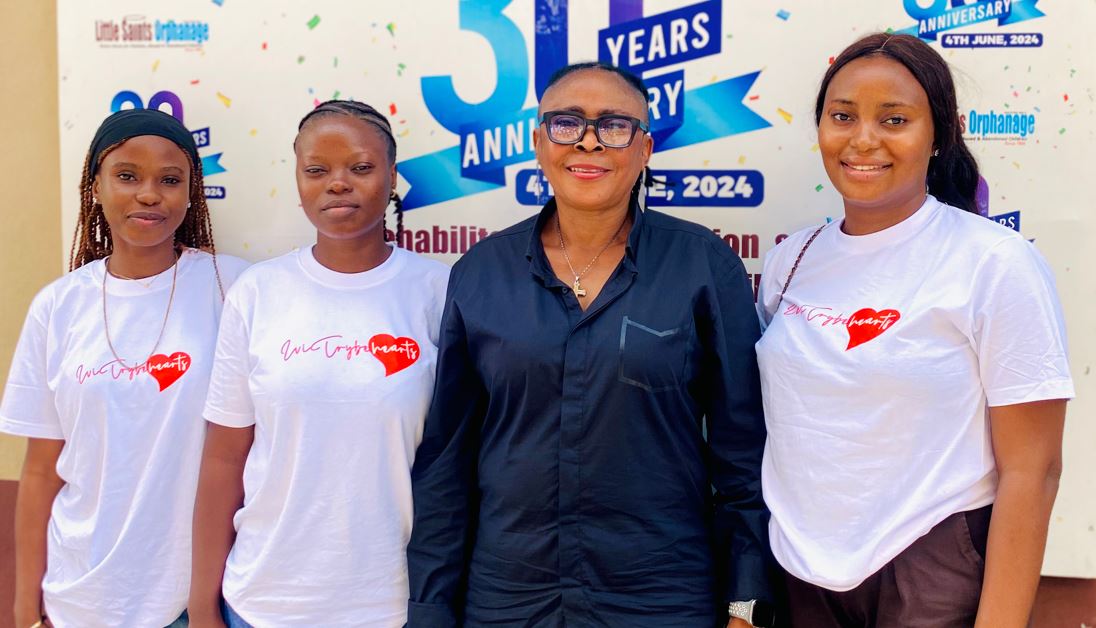News
Nigeria Loses N126.2Bn on Abandoned FG Properties in Lagos – Unilag Don

The Federal Government has again been charged to either concession or sell all its buildings that are not being utilized across the country to private investors in order to forestall further deterioration as a result of continued abandonment.
Prof. Olumide Afolarin Adenuga, professor of Building, who gave the charge in his inaugural lecture at the J.F Ade Ajayi Memorial Hall, University of Lagos, Akoka, on Wednesday, said, N126.2 billion revenue have been lost since 2006 on the Federal Government properties in Lagos State alone, because the government have refused to either sell or concession the assets.
Adenuga, a professor of building management lamented that the nation have been hemorrhaging as a result of the neglect of the buildings, warning that the huge economic benefits of these iconic structures would continue to elude the nation if the government continue to ignore the need to restore them to beneficial use for Nigerians.
The university don who said maintenance is as old as creation, said man have had to contend with managing his space and the ecosystem since he abandoned a wandering lifestyle to adopt a settled life, pointing out that maintenance was responsible for increased lifespan of structures such as the Egyptian pyramids, the Papal States in the Vatican City, The White House in the United States and the Golden Temples, and other monuments, most of which have been kept in same serviceable condition as they were at the time of their construction.
For him, it is regrettable that many of the nation’s iconic assets, which were pleasant to look at, at the time of their construction, had been allowed to degenerate due to lack of maintenance and planned repairs that could have reversed the trend and turned them into positive economic assets.
“It is a glaring fact that our buildings are in very poor and deplorable conditions of structures and decorative disrepair, abandoned and reduced more or less to refuse dumps and natural homes for rodents and vermins in spite of billions of Naira spent to build and commission them.”
Adenuga listed among such assets wasting away in Lagos State to include; the National Stadium, Surulere, the Federal Secretariat Complex, Ikoyi, The Nigerian Eternal Telecommunications (NET) building, Marina, the Defence House (formerly Independence Building), and the former NAVY Headquarters building in Marina. Other buildings according to him are: the National Arts Theatre, Iganmu, former National Assembly complex, Tafawa Balewa Square, and the Supreme Court building among others.
He said: “All these buildings are in deplorable states of structural and decorative repairs because we do not have any maintenance culture, a fact which manifests in the general apathy for maintenance coupled with ignorance on the part of occupiers of the benefits of planed preventive maintenance and care of buildings.”
According to him, the cumulative potential economic loss at the National Stadium alone, between 2004 to date, is about N52.6 billion, while the Federal Secretariat, which has been overgrown with weeds and is now home to reptiles and rodents, could have been yielded over N72 billion, if it had been converted to luxury residential apartments as proposed by Resort international Limited since 2006, while the 32-storey NET building with about 720 sq. metres of lettable space could have attracted over N1.6 billion in rent annually if well maintained and optimally utilised.
He said apart from the loss of the huge revenue which could have been ploughed back into provision of social amenities for Nigerians, the 480 units of luxury residential apartments being proposed by RIL could have contributed to reducing the shortfall in the nation’s housing stock.
“Because of their present deplorable state, these once iconic structures have become a nuisance not only to the city of Lagos and her residents, but is also a source of economic loss arising from abandonment and gross under-utilisation,” he added.
He said since it hardly feasible to construct buildings that are maintenance free, it is desirable for experts to think of building maintenance projections even at the design stage to reduce the cost of maintenance work throughout the lifespan of a building.
“All elements of buildings deteriorate at a greater or lesser rate depending on the materials used, methods of construction, environmental conditions, and the use of the building,” he said.
To reverse the trend of improper maintenance of public or private properties, Adenuga recommended a formulation and formalization of regular minimum repair programme, regular and effective inspection of all the fabrics of the buildings, including their sorroundings, as well as the comfort of the occupants to detect signs of disrepair, prompt attention to repair needs of buildings, to prevent further deterioration in order to keep the buildings in acceptable standards.
He canvassed planned preventive maintenance, which according to him are best accommodated at the design and construction stages of building development, even as he urged occupiers of buildings to be adequately educated to report, as soon as noticed, defects for prompt maintenance even as he charge them to use the property in such a way as to keep them in good tenantable conditions.
He canvassed that occupiers of public properties should be responsible for repairs and maintenance of the properties, the avoidance of deliberate alterations, which may lead to immediate or eventual decline in the state and aesthetic value of property, the standardization of building components.
He added that property owners, both private and public, should guide against overcrowding which may result in over-use of facilities and undue pressure on sanitary facilities.
Adenuga, a product of the polytechnic system, who described the lecture as his debt to academic and scholarship, is the second professor to have given his inaugural lecture in the Department of Building and the ninth professor in the Faculty of Environmental Sciences of the University of Lagos.
News
OAU Taps Aderounmu, Tech Advocate as DVC Academics

Obafemi Awolowo University (OAU), Ile-Ife, has appointed Professor Adesola Aderounmu, renowned computer scientist and technology advocate, as its new Deputy Vice-Chancellor (Academics).

Professor Adesola Aderounmu
The decision, made by the university’s Senate, marks a strategic step towards aligning OAU’s academic vision with technological innovation and global best practices.
A distinguished scholar and leader in Computer Science and Engineering, Professor Aderounmu brings decades of experience to this pivotal role.
He has served as the Centre Lead for the African Centre of Excellence in Software Engineering and the Obafemi Awolowo University Knowledge Park (OAK-Park), where he has driven initiatives that advance technological innovation and academic excellence.
His leadership journey includes serving as Dean of the Faculty of Technology and Head of the Department of Computer Science, as well as President of the Nigeria Computer Society from 2015 to 2019. Under his stewardship, the Africa Centre of Excellence in ICT (OAK-Park) was established and has flourished, positioning OAU as a hub for digital transformation in Nigeria and across Africa.
“This is an opportunity to shape the future of education at OAU,” Professor Aderounmu stated. “I am committed to fostering an environment where ideas thrive.”
Professor Aderounmu’s appointment as DVC Academics carries significant implications for the information technology profession and industry in Nigeria and Africa.
His leadership is expected to further bridge the gap between academia and industry, aligning curriculum with emerging technological trends, and fostering research that directly addresses the needs of Nigeria’s evolving digital economy.
His commitment to developing high-level ICT talent will contribute to strengthening the nation’s capacity in critical areas such as artificial intelligence, cybersecurity, software engineering, and digital entrepreneurship.
As Nigeria and Africa continue to embrace digital transformation, this appointment signals a continued push for collaboration between universities and the technology industry, ensuring that graduates are equipped with globally relevant skills while advancing innovative research that supports the tech ecosystem.
This appointment recognises Professor Aderounmu’s unwavering commitment to research, excellence in education, and visionary leadership, and marks a significant milestone in the university’s ongoing mission to deliver impactful education and innovation for national and continental development.
News
IviTrybe Hearts Takes Kindness Drive to Little Saints Home

In a heartwarming demonstration of corporate social responsibility and community impact, IviTrybe Hearts, a key initiative driven by members of IviTrybe – a vibrant group of budding marketing communications specialists – visited the Little Saints Orphanage, Akowonjo branch.

The visit, part of IviTrybe’s ongoing commitment to societal betterment, was significantly supported by Pladis Foods Nigeria, which generously donated gift items and products.
IviTrybe is a social responsibility initiative of IVI PR, a dynamic public relations agency dedicated to not only elevating brands but also fostering positive societal impact. This initiative provides focused practical training covering brand strategy and public relations, directly addressing the critical issue of insufficiently skilled manpower within Nigeria’s Public Relations industry. Through the #IviTrybeHearts program, the group channels its growing expertise into meaningful community engagement.
During the visit, the IviTrybe Hearts team dedicated the day to creating a memorable and impactful experience for the children. Activities included extensive bonding and interaction sessions, where members engaged in games and companionship, fostering an atmosphere of joy and connection. Essential items were donated to support the orphanage’s daily needs, and motivational talks were delivered, inspiring the children with words of encouragement and hope for their futures.
Busari Toheeb Dolapo, IviTrybe Coordinator and spokesperson for the project, underscored the essence of the visit, stating, “For whom much is given, much is expected. We have been empowered through knowledge and mentorship at IVI PR, and it’s only right that we channel that privilege into making a difference. The smiles on the children’s faces today reminded us why giving back is non-negotiable.”
The management of Little Saints Orphanage expressed profound gratitude for the support and the tangible impact of the donations, emphasising how such gestures significantly improve the lives and spirits of the children under their care.
Through impactful initiatives like IviTrybe Hearts, IviTrybe continues to exemplify how youth-led action, empowered by practical training and a strong sense of responsibility, can effectively shape communities and enrich lives for the better.
News
INTERPOL Report Shows Cybercrime is West, East African Most Dominant Security Concern

Cybercrime has emerged as a dominant security concern across Africa, with more than 30 percent of all reported crimes in Western and Eastern regions linked to cyber activity, according to the newly released 2025 Africa Cyberthreat Assessment Report by INTERPOL.

The report, based on data from African member states and private sector partners, reveals that two-thirds of surveyed countries describe cybercrime as constituting a medium to high share of total criminal cases.
This highlights how cyber-enabled criminal activity is evolving rapidly across the continent. The report identified alarming spikes in scam attempts, with some countries witnessing a 3,000 percent increase in suspected scam notifications in the past year.
Neal Jetton, INTERPOL’s Cyber Crime Director, warned that the threat landscape is evolving faster than enforcement responses.
“This fourth edition of the INTERPOL African Cyber Threat Assessment provides a vital snapshot of the current situation, informed by operational intelligence, extensive law enforcement engagement, and strategic private-sector collaboration.
“It paints a clear picture of a threat landscape in flux, with emerging dangers like AI-driven fraud that demand urgent attention. No single agency or country can face these challenges alone,” Jetton stated.
In the past year, suspected scam notifications rose by up to 3,000 per cent in some African countries, according to data from Kaspersky, one of several private sector partners that work with INTERPOL’s cybercrime directorate
Online scams, particularly through phishing, are the most frequently reported cybercrimes across the continent. Ransomware attacks and Business Email Compromise (BEC) incidents are also increasing, particularly in Nigeria, Kenya, South Africa, and Egypt.
“Ransomware detections in Africa also rose in 2024, with South Africa and Egypt suffering the highest number, at 17,849 and 12,281 detections respectively, according to data from Trend Micro, followed by other highly digitised economies such as Nigeria (3,459) and Kenya (3,030),” it stated.
Incidents included attacks on critical infrastructure, such as a breach at Kenya’s Urban Roads Authority (KURA), and on government databases, such as hacks of Nigeria’s National Bureau of Statistics (NBS), the report stated.

 General News3 days ago
General News3 days agoNigeria’s BNPL Market is Projected to Value @ $2.6B by 2030

 Telecom3 days ago
Telecom3 days agoFree WiFi Meets Mega Entertainment at the Grand Opening of Solution Fun City

 E-Financial3 days ago
E-Financial3 days agoNIA Puts Industry Written Premium @ N1.5trn in 2024

 Telecom3 days ago
Telecom3 days agoInstagram Safety Tools Every Parent Should Know About

 Telecom3 days ago
Telecom3 days agoV-Malaysia 2025: QNET Strengthens Global Network with Landmark 5-Day Event

 E-Financial3 days ago
E-Financial3 days agoUN and Sterling One Foundation Lead Coalition Ahead of ASIS 2025

 News3 days ago
News3 days agoINTERPOL Report Shows Cybercrime is West, East African Most Dominant Security Concern

 E-Financial13 hours ago
E-Financial13 hours agoShareholders Oppose Transfer of Unclaimed Dividend to CBN
















